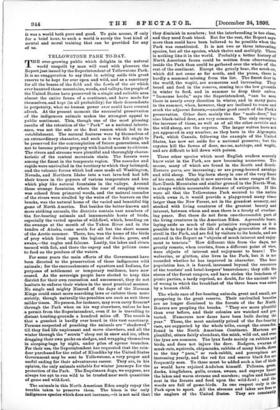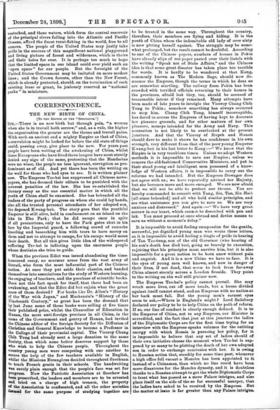YELLOWSTONE PARK TO-DAY.
THE ever-growing public which delights in the natural world unspoilt by man will read with pleasure the Report just issued by the Superintendent of Yellowstone Park. It is no exaggeration to say that in setting aside this great reserve to be kept for ever open and wild, and as a sanctuary for all the beasts of the field and the fowls of the air which ever haunted those mountains, woods, and valleys, the people of the United States have preserved in a single and suitable area almost the entire fauna of a continent, and have made for themselves, and kept (in all probability) for their descendants in perpetuity, what no human power ever could have created afresh. At the present moment the successful preservation -of the indigenous animals makes the strongest appeal to public sentiment. This, though one of the most pleasing results of the retention of the " Park " as a national inherit- .ance, was not the sole or the first reason which led to its establishment. The natural features were by themselves of an extraordinary character, and such as it was felt ought to be preserved for the contemplation of future generations, and not to become private property with limited access to citizens. The rivers and streams were plentiful and thoroughly charac- teristic of the central mountain chain. The forests were among the finest in the temperate region. The cascades and rapids were unrivalled in the territory to which they belonged, and the volcanic forces which had once made all Washington, Nevada, and Northern Idaho into a vast lava-bed had left their traces in the geysers of various temperature and hue which play like natural fountains in the valleys. Around these strange fountains, where the roar of escaping steam was echoed from primmval woods, and the natural cascades of the rivers were rivalled by the weirs of the beavers on the brooks, was the natural home of the varied and beautiful big game of North America. Bat besides the better-known and more striking animals, the districts contain vast numbers of the far-bearing animals and innumerable hosts of birds, especially the varied species of wild-fowl, which, breeding on the swamps at the month of the Yukon River and in the tundra of Alaska, come south for all but the short season of the Arctic summer. There, too, was the home of the birds of prey which lived upon the legions of ducks, geese, and swans,—the eagles and falcons. Lastly, the lakes and rivers teemed with fish, and there the osprey and the pelican came to feed on the produce of the waters.
For some years the main efforts of the Government have been directed to the preservation of these indigenous wild animals ; for the encroachments of squatters and Indians, for purposes of settlement or temporary residence, have now ceased_ As the sovereign people have elected to keep this district for their own recreation and amusement, they do not hesitate to enforce their wishes in the most practical manner. No single and mighty Nimrod of the days of the Norman Kings could enact more searching laws or enforce them more strictly, though naturally the penalties are such as suit these milder times. No person, for instance, may even carry firearms through the Park when on his way elsewhere, unless he has .a permit from the Superintendent, even if he is travelling to distant hunting-grounds a hundred miles off. The result is that a gunshot is hardly ever heard in this vast sanctuary. Persons suspected of poaching the animals are " shadowed" till they find life unpleasant and move elsewhere, and all the winter through the " scouts " sleep out in snow and ice, often dragging their own packs on sledges, and wrapping themselves in sleeping-bags by night, under piles of spruce branches. For their use, the Superintendent has requested that the rein- deer purchased for the relief of Klondike by the United States Government may be sent to Yellowstone, a very proper and useful ending for their adventurous career. They are, in his opinion, the only animals suitable for winter journeys for the protection of the Park. The Esquimaux dogs, we suppose, are always too apt to run wild to be trusted near such quantities of game and wild-fowL The animals in this North American Eden amply repay the trouble taken to preserve them. The bison is the only indigenous species whioh does not increase,—it is not said that they diminish in numbers; but the interbreeding is too close, and they need fresh blood. But for the rest, the Report says more than could have been believed to be possible when the Park was constituted. It is not two or three interesting species, but all the species, which thrive and multiply. There is nothing like it in the world. Probably a better history of North American fauna could be written from observations inside the Park than could be gathered over the whole of the rest of the continent. Except the grizzly bear, the musk-ox, which did not come so far south, and the puma, there is hardly a mammal missing from the list. The finest deer in the world, the wapiti, are numerous and increasing. They breed and feed in the reserve, coming into the low grounds in winter to feed, and in summer to drop their calves. "Immense herds," says the Superintendent, "can be seen there in nearly every direction in winter, and in many parts in the summer, when, however, they are inclined to roam and stock the adjacent forests,—another good result of the Park's preservation. Other deer, mainly the fine "mule-deer," but also black-tailed deer, are very common. The only enemy to the increase of these, as well as of all the other cervidx and the wild sheep, are the coyotes. The larger wolves have not yet appeared in any number, as they have in the Algonquin Park, which Canada, following the example of the United States, has now set aside for a national preserve; but the coyotes kill the fawns of deer, moose, autelope, and wapiti, and are difficult to kill down with poison.
Three other species which most English readers scarcely know exist in the Park, are now becoming numerous. The moose, many of which are found in the South and South- Eastern parts, are increasing; so are prong-horned antelope and wild sheep. The big-horn sheep is one of the very finest of his race, and though it now survives in some ranges of the Saw-Tooth Mountains and similar ground in the North-West, is always within measurable distance of extirpation. If this were all that the Yellowstone Park secured to the nation which owns it, it would provide a playground many times larger than the New Forest, set in the grandest scenery, and stocked with living creatures of the greatest beauty and interest, between whom and man there is a treaty of everlast- ing peace. But these do not form one-thousandth part of the living creatures in the American Eden. Agreeable bears, laying aside as much of their primitive roughness as it is possible to hope for in the life of a single generation of man, stroll in the Park, and are fed by visitors to its hotels, and are entered in the Report as "objects of much interest and enjoy- ment to tourists." How different this from the days, not greatly remote, when tourists, from a different point of view, were objects of interest and enjoyment to bears! The wolverine, or glutton, also lives in the Park, but it is not recorded whether he has improved in character. The bear population has, it is feared, increased beyond the resources of the tourists' and hotel-keepers' benevolence; they rifle the stores of the forest rangers, and have stolen the luncheon of picnic parties, a tardy reprisal, no doubt, for the ancient tale of wrong in which the breakfast of the three bears was eaten by a human child.
The whole race of fur-bearing animals, great and small, are prospering in the great reserve. Their unrivalled beauties are no longer dismissed to the forests of the far North. Beavers are peopling the brooks. "They are more plentiful than ever before, and their colonies are watched and pro- tected. Numerous new dams have been built during the year." These, the most anciently prized of the fur-bearing race, are supported by the whole tribe, except the cross-fox, found in the North American Continent. Martens are plentiful, otters fairly abundant, the mink, wild cat, and even the lynx are common. The lynx feeds mainly on rabbits and birds, and does not injure the deer. Badgers, swarms of musk-rats, squirrels, chipmunks, rabbits of many kinds, down to the tiny "pace," or rock-rabbit, and porcupines are increasing yearly, and the red fox and scarce black fox are frequently seen. To these must be added such a list of bird' as would have rejoiced Audubon himself. Pelicans, geese, ducks, kingfishers, gulls, cranes, swans, and ospreys haunt the lakes and warm streams and marshes; eagles and falcons nest in the forests and feed upon the wild-fowl ; and the woods are full of game-birds. In one respect only is the Park open to sport. All the streams and lakes are free to the anglers of the United States. They are oonstantll restocked, and these waters, which form the central reservoir of the principal rivers falling into the Atlantic and Pacific Oceans, afford the finest trout-fishing in the world, free to all comers. The people of the United States may juetly take pride in the success of this magnificent national playground and living picture of forest and wilderness, which is theirs and their heirs for ever. It is perhaps too much to hope that the limited space in our island could ever yield such an ,'open space" for our people. But the foresight of the United States Government may be imitated on more modest lines; and the Crown forests, other than the New Forest, which is already protected, should, on the termination of each existing lease or grant, be jealously reserved as "national parks" in miniature.







































 Previous page
Previous page